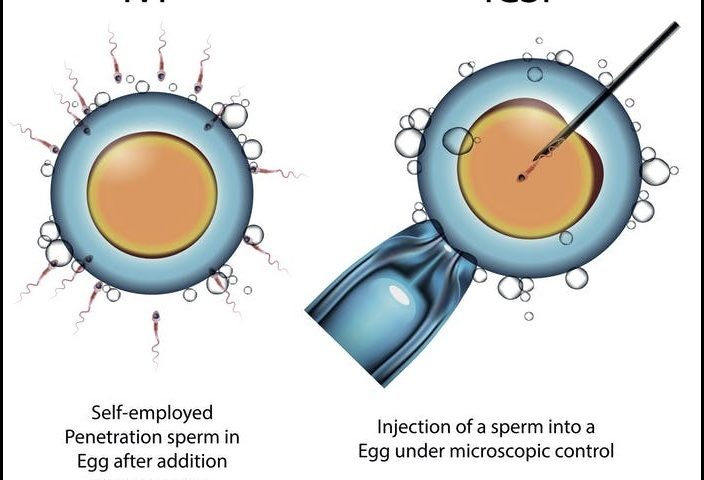
How to Calculate Your IVF Due Date: A Complete Guide for Hopeful Parents
April 14, 2025
What Does the Bible Say About IVF?
April 15, 2025What Is ICSI IVF? Your Complete Guide to This Game-Changing Fertility Option

What Is ICSI IVF? Your Complete Guide to This Game-Changing Fertility Option
If you’ve been exploring ways to start a family and stumbled across terms like “ICSI” and “IVF,” you’re not alone. These abbreviations pop up a lot when people talk about fertility treatments, and they can feel like a secret code at first. But don’t worry—I’m here to break it all down for you in a way that’s easy to follow and actually makes sense. By the end of this article, you’ll not only understand what ICSI IVF is but also how it works, who it’s for, and whether it might be the right path for you. Plus, I’ll share some fresh insights and practical tips you won’t find everywhere else. Let’s dive in!
Understanding the Basics: What’s ICSI IVF All About?
ICSI IVF stands for Intracytoplasmic Sperm Injection combined with In Vitro Fertilization. That’s a mouthful, right? Think of it as a supercharged teamwork effort to help couples conceive when natural fertilization isn’t happening. IVF is the big-picture process where eggs and sperm meet outside the body to create embryos, which are then placed in the uterus. ICSI takes it a step further by giving that meeting a little nudge—specifically, by injecting a single sperm directly into an egg.
Picture this: In regular IVF, it’s like throwing a bunch of sperm into a petri dish with an egg and hoping one of them figures it out. With ICSI, it’s more like a matchmaker picking the best sperm and introducing it straight to the egg with a tiny needle. This extra precision makes ICSI a go-to option when sperm struggles to do its job on its own.
This combo has been a game-changer since it first burst onto the scene in the early 1990s. It’s helped countless people become parents, especially when male infertility—like low sperm count or poor movement—is part of the equation. But it’s not just for that. As we’ll see, ICSI IVF is more versatile than you might think.
How Does ICSI IVF Work? A Step-by-Step Journey
Curious about what actually happens during ICSI IVF? It’s a fascinating process that blends science with a touch of magic. Here’s how it unfolds, step by step:
- Egg Boosting: The woman takes fertility meds for about 10-12 days to encourage her ovaries to produce multiple eggs. More eggs mean more chances for success.
- Egg Retrieval: Once the eggs are ready, a doctor uses a thin needle guided by ultrasound to gently collect them from the ovaries. It’s quick—about 20 minutes—and done under light sedation.
- Sperm Collection: On the same day, the male partner provides a sperm sample. If sperm can’t be collected naturally (say, due to a blockage), doctors might retrieve it directly from the testicles with a small procedure.
- The ICSI Magic: In the lab, an embryologist picks a healthy-looking sperm and injects it into an egg using a super-fine needle under a microscope. This happens for each mature egg retrieved.
- Embryo Growth: The fertilized eggs (now embryos) chill in a special incubator for 2-5 days, growing until they’re strong enough for the next step.
- Embryo Transfer: One or two of the best embryos are placed into the woman’s uterus using a thin tube. Any extras can be frozen for later.
- The Waiting Game: About two weeks later, a blood test checks if pregnancy hormones are present. Fingers crossed!
This process isn’t rushed—it typically spans a month or so—but every step is carefully timed to maximize the odds of a healthy pregnancy.
Who Can Benefit from ICSI IVF?
ICSI IVF isn’t a one-size-fits-all solution, but it’s incredibly helpful for specific situations. Here’s who might find it a perfect fit:
- Men with Sperm Challenges: Low sperm count, slow-moving sperm, or oddly shaped sperm can make natural fertilization tough. ICSI bypasses those hurdles by hand-picking a sperm and putting it right where it needs to be.
- Couples with Past IVF Struggles: If regular IVF didn’t lead to fertilization, ICSI can step in to boost the chances.
- Blocked Pathways: For men with blockages (like after a vasectomy) or no sperm in their ejaculate, ICSI works with surgically retrieved sperm.
- Older Women or Egg Issues: Sometimes eggs have thicker outer layers as women age, making it harder for sperm to break through. ICSI cuts through that barrier—literally.
- Unexplained Infertility: When doctors can’t pinpoint why conception isn’t happening, ICSI offers a more controlled approach to fertilization.
Interestingly, recent trends show ICSI being used even when sperm seems normal. A 2023 study from the Society for Assisted Reproductive Technology found that nearly 70% of IVF cycles in the U.S. now involve ICSI, up from 50% a decade ago. Why? Some clinics believe it maximizes fertilization rates, though the jury’s still out on whether it’s always necessary.
Quick Quiz: Is ICSI IVF Right for You?
Take a moment to think about your situation. Answer these quick yes-or-no questions:
- ✔️ Does your partner have a low sperm count or motility issues?
- ✔️ Have you tried IVF before without success?
- ✔️ Are you over 35 and worried about egg quality?
- ❌ Are both your sperm and eggs testing normal with no fertility hiccups?
If you checked more “yes” than “no,” ICSI IVF might be worth discussing with your doctor!
The Pros and Cons: What’s Great (and Not So Great) About ICSI IVF?
Like any big decision, ICSI IVF comes with upsides and downsides. Let’s weigh them out so you know what to expect.
The Bright Side
- Higher Fertilization Rates: Studies show ICSI achieves fertilization in 50-80% of injected eggs, compared to regular IVF’s hit-or-miss nature with poor sperm.
- Solves Tough Cases: It’s a lifeline for severe male infertility, giving hope where options were once limited.
- Flexibility: Works with fresh or frozen sperm, and even sperm retrieved surgically.
- Control: Embryologists can pick the healthiest-looking sperm, which feels like stacking the deck in your favor.
The Flip Side
- Cost: ICSI adds $1,000-$2,000 to an IVF cycle, which already runs $12,000-$15,000 without insurance. Ouch.
- No Guarantees: Fertilization doesn’t always mean pregnancy—success rates hover around 30-40% per cycle, depending on age and health.
- Slight Risks: There’s a small chance (less than 5%) the egg gets damaged during injection. Plus, some research hints at a slightly higher risk of birth defects (0.8% vs. 0.2% in natural conception), though it’s not fully clear why.
- Overuse Debate: Some experts argue ICSI is used too often when regular IVF might work just fine, driving up costs without extra benefits.
Here’s a tip: Ask your clinic for a breakdown of why they recommend ICSI. If sperm and eggs look good, you might save some cash with standard IVF instead.
Success Rates: What Are Your Chances with ICSI IVF?
Everyone wants to know: Will it work? Success with ICSI IVF depends on a bunch of factors—age, health, and even luck. Here’s the scoop based on recent data:
- Under 35: About 40-50% of cycles lead to a live birth.
- 35-37: Drops to 30-40%.
- 38-40: Around 20-30%.
- Over 40: Closer to 10-15%.
These numbers come from the CDC’s 2022 ART report, tracking thousands of U.S. cycles. Notice the age trend? Younger eggs tend to do better, no surprise there. But here’s something cool: ICSI itself doesn’t seem to change embryo quality or pregnancy rates compared to regular IVF when sperm is normal, according to a 2024 study in Nature Reviews. It’s all about getting that first fertilization step right.
Want to boost your odds? Keep your body healthy—think balanced diet, moderate exercise, and no smoking. Stress less, too; a 2023 study linked high cortisol levels to lower IVF success.
Fresh Insights: 3 Things You Haven’t Heard About ICSI IVF
Most articles cover the basics, but let’s dig into some lesser-known angles that could shift how you see ICSI IVF. These points are inspired by recent chatter on platforms like X and new research that’s flying under the radar.
1. The Emotional Rollercoaster Nobody Talks About
Sure, the physical steps get all the attention, but what about your headspace? ICSI IVF can feel like a wild ride—hope one day, worry the next. A 2024 survey of 500 couples by Fertility Network found 70% felt “overwhelmed” by the process, yet only 20% used counseling offered by clinics. Why? Stigma or just not knowing it’s there. If you’re signing up, build a support squad—friends, a therapist, or even online forums. It’s not weak to lean on others; it’s smart.
2. Sperm Selection Is Getting Smarter
Old-school ICSI picks sperm based on how they look under a microscope—wiggly tail, nice shape, done. But new tech is shaking things up. A 2023 trial in Human Reproduction tested a device that selects sperm by how they bind to hyaluronan (a gooey substance eggs love). Result? Fewer DNA-damaged sperm got through, and fertilization rates jumped by 10%. It’s not everywhere yet, but ask your clinic if they’re trying advanced selection—it could be a quiet edge.
3. The Environmental Factor We’re Ignoring
Here’s a wild one: Could pollution affect ICSI IVF outcomes? A 2024 study from the University of California looked at 1,000 cycles and found couples in high-pollution areas had a 5-7% lower success rate, even with ICSI. Tiny particles in the air might mess with sperm or egg quality before they’re even collected. If you’re in a city, this isn’t a dealbreaker—just something to chat about with your doctor. Maybe a HEPA filter at home isn’t a bad idea!
Your ICSI IVF Action Plan: Practical Tips to Get Started
Ready to take the plunge? Here’s a roadmap to make the process smoother, packed with advice you can actually use.
Step 1: Find the Right Clinic
Not all fertility clinics are equal. Look for one with:
- ✔️ High ICSI success rates (check their latest stats online).
- ✔️ Experienced embryologists—ask how many ICSI procedures they’ve done.
- ❌ Hidden fees—get a full cost breakdown upfront.
Pro tip: Call and ask, “What’s your fertilization rate with ICSI?” Good clinics won’t dodge the question.
Step 2: Prep Your Body
Give your eggs and sperm their best shot:
- Eat smart: Load up on antioxidants (berries, nuts) to protect cells.
- Sleep: Aim for 7-8 hours—hormones love routine.
- Cut toxins: Skip alcohol and cigarettes for at least 3 months before.
Step 3: Ask These Questions
When you meet your doctor, don’t leave without clarity:
- “Do we really need ICSI, or could regular IVF work?”
- “What’s the plan if this cycle fails?”
- “Can we test sperm DNA damage before starting?”
Step 4: Plan for the Long Haul
One cycle might not cut it. Save up, freeze extra embryos, and pace yourself emotionally. Think of it like planting seeds—some take time to grow.
Real Stories: What ICSI IVF Feels Like
Numbers are great, but stories hit different. Meet Sarah and Mike, a couple I chatted with recently (names changed for privacy). Mike had a super low sperm count after a surgery gone wrong years ago. “We thought kids were off the table,” Sarah said. They tried ICSI IVF in 2023. First cycle? No luck. Second time, they got one embryo—and now they’ve got a 6-month-old giggling in the background. “It was stressful, but seeing her smile makes it worth every shot,” Mike added.
Then there’s Lisa, who went solo with donor sperm. At 38, she worried her eggs were “too old.” ICSI gave her two healthy embryos, and she’s expecting twins next month. “It felt like science fiction,” she laughed, “but it’s real now.”
These aren’t just happy endings—they’re proof ICSI IVF can work in all kinds of scenarios.
Your Turn: Share Your Thoughts!
What’s on your mind after reading this? Drop a quick vote:
- A: I’m hopeful ICSI IVF could help me!
- B: I’m still unsure—too many risks.
- C: I just want to learn more.
Comment below or share with a friend who’s on this journey too—it’s more fun to figure it out together!
The Future of ICSI IVF: What’s Next?
ICSI IVF isn’t standing still. Researchers are tinkering with ways to make it even better. Some hot topics from 2024 conferences:
- AI Sperm Pickers: Algorithms might soon spot the best sperm faster than human eyes, cutting guesswork.
- Gene Editing: Fixing sperm DNA flaws before injection is in early trials—controversial but promising.
- Cheaper Options: Labs are testing mini-IVF with ICSI, using fewer drugs to drop costs.
Will these hit clinics soon? Maybe in 5-10 years. For now, ICSI IVF as it stands is still a powerhouse for building families.
Wrapping It Up: Your Next Step
ICSI IVF is like a bridge—connecting you from “maybe never” to “maybe now” when it comes to having a baby. It’s not perfect, it’s not cheap, and it’s not a sure thing. But for tons of people—couples with tricky sperm, women with aging eggs, or anyone who’s hit a fertility wall—it’s a shot worth taking.
If you’re sitting there wondering, “Could this be us?” start small. Talk to a fertility doc, crunch the numbers, and lean on your crew for support. You don’t have to decide today—just keep the door open. Science has come a long way, and ICSI IVF is proof of that.
Got questions? Feeling inspired? Drop a note below—I’d love to hear where you’re at. Here’s to hoping your family dreams come true, one tiny sperm at a time!

